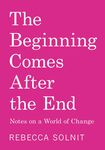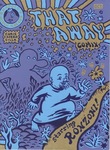
What can you say about a book that opens with a Galactus quote from Fantastic Four #49, drops more comics references -- particularly to the classics of the 1980s -- than any novel we've ever read, clearly shows the influence of Gilbert Hernandez's Palomar and, especially, Luba stories, AND won the Pulitzer Prize for best novel of 2007? We'd say, "This is a must read! Particularly suitable for fans of Jonathan Lethem's Fortress of Solitude and Michael Chabon's (also Pulitzer Prize winning) The Amazing Adventures of Kavalier and Clay." And then we'd add: The Brief Wondrous Life of Oscar Wao is a gigantic meditation on the inner life of the fanboy. Its subject is disguised in some ways and blatant in others, but it is on every level derived from and is filled with insights into the role that comics and its partners in geekdom -- SF & fantasy, videogaming, role playing, etc -- play in bearing the costs of the sins of the world, especially those sins of the father (figurative as well as literal) that are visited on the son. Clearly, most readers won't see it in this light to the same degree, but we feel compelled to harp on it as this book won the Pulitzer, and while its author, Junot Díaz, is clearly chock full of talent and developed a strong and engaging voice that made the novel a pleasure to read, and of course deserves all the credit for putting pen to paper and creating it, it owes its key insights to comics -- especially to Gilbert Hernandez, from whom he derived his narrative strategy, but also to Chris Ware (whom he intriguingly neglects to give any props to [unless we missed them], perhaps indicating a guilty conscience?) for providing the central insights into the soul of the fanboy. From these two he derived the deep structures that underpin the entire work, but its surface is peppered ceaselessly throughout with references to comics (and Tolkien, science fiction, etc.) and as a whole provides yet another example of how comics and other narrative sources of fantasy have infiltrated American culture at level after level (and in the context of this novel, it is fairly explicit that America should be considered the entirety of the "new world," extending outside of the borders of the USA). It's a fascinating fact that California, which became home to the dream factory par excellence, was named after a fictional land depicted in a Spanish novel which was at the height of its popularity when this land was first claimed by Spain, indicating the inextricable bonds between fantasy, reality and history. The Brief Wondrous Life of Oscar Wao continues this long-running tradition.

I'm sure that we were not alone in thinking that the last few issues of McSweeney's had not been living up to the high design and content standards that they had set for themselves over the years. We were beginning to wonder if, perhaps, the enterprise had run out of gas, and that Eggers & Co. had set their priorities elsewhere. And while the latter may very well have been the case, we are happy to announce that, with, at least, it's thirty-third issue, all those concerned have put McSweeney's back front and center. This is a knock-your-socks-off issue that asks – and boldly answers – the question, "What's so good about a newspaper, anyway?" McSweeney's 33 is, more or less, a what-if? fantasy of what the San Francisco Sunday paper could be like in an alternative universe where profit-driven capitalism did not govern all enterprise-related decisions. Originally published and distributed in San Franciso on December 9, 2009, it is now available to the rest of us. More or less patterned after the Sunday New York Times (only bigger – a whoppin' 15" x 22"!), this hefty newspaper edition of McSweeney's is filled with engaging, well written articles on all sorts of topics and at all lengths from (rough guess, here) 100 to 10,000 words. The graphics department has taken full advantage of the oversize "canvas" offered by these large broadsheets, and the printing and paper are excellent for full visual impact. There is a 96-page book review insert printed on extra high quality paper stock that is not only filled with reviews but also: interviews with the likes of Junot Diaz, Miranda July and James Franco; new, original short works of fiction by George Saunders, Deb Olin Unferth, Roddy Doyle and others; a gigantic feature on the work of J.G. Ballard by Geoff Nicholson; pages of letters; and more! There is an oversize 112-page magazine insert that is printed on an even higher grade of paper stock that is overflowing with in-depth essays on all and sundry as well as columns by Michael Chabon, Chip Kidd and others. And, of course, we have saved the best for last: there is an honest-to-God, good-old-fashioned, 16-page, full color comics section, filled with all new work by Dan Clowes, Chris Ware, Alison Bechdel, Adrian Tomine, and plenty more. And, as if this weren't already enough, there's a bonus Acme Novelty Library, Rocket Sam cut-out by Chris Ware to while away a lazy Sunday afternoon. Don't miss this vibrant, full-blooded testimonial to the power and glory of newspapers.
ONE complete, bagged copy available..., GONE!

Another in the series of always enjoyable and surprise filled annual anthologies. Includes "Best American Lonely Guy"!

Admit it, you saw this book when it came out and went, "Wow, Junot and Jaime - awesome!" But then, you saw the $40 price tag and paused... maybe next time. Well, next time has arrived, but it won't last long. We were able to score one box of this swellegant slipcased hardcover edition of Junot Diaz short stories with cover, endpapers and illustrations by the one and only Jaime Hernandez at jaw-droppingly low price, and are passing the savings on here by offering it for substantially less than even the paperback! Now is the time. PLEASE NOTE: LIMIT ONE PER CUSTOMER... ¡SOLD OUT!










